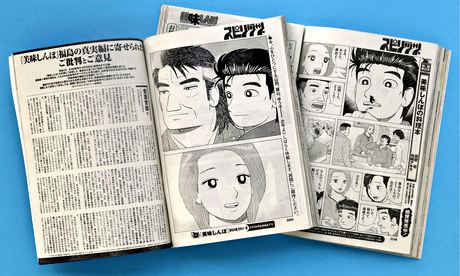
One of Japan's most popular manga series is at the centre of a row over the possible health effects of radiation from Fukushima Daiichi.
In a recent edition of Oishinbo (The Gourmet), the main character, a journalist, blames radiation exposure for nosebleeds he experiences after a reporting trip to the plant.
Reports of nosebleeds among Fukushima evacuees are not uncommon, but when they were linked to radiation exposure in the long-running manga series, which usually focuses on cuisine, even the prime minister, Shinzo Abe, was moved to respond.
"There is no confirmation that anyone's health has been directly affected by radioactive substances. The government will do its utmost to take action against baseless rumours," Abe said after the outcry over the edition, entitled The Truth of Fukushima, forced its publisher, Shogakukan, to suspend the series.
This week, the magazine in which the Oishinbo series appears, Big Comic Spirits, ran a 10-page special on the furore featuring comments from experts and local government officials for and against its controversial storyline.
Health officials say there is no connection between the incidence of nosebleeds and exposure to radiation, with some insisting the condition is more likely to be caused by the stress of evacuation.
While more than 18,000 people died in the earthquake and tsunami that triggered the nuclear crisis, so far there have been no confirmed illnesses related to radiation among nuclear plant workers or residents of Fukushima.
Local medical authorities say there is no established link between the accident and 89 confirmed and suspected cases of thyroid cancer found among Fukushima children and teenagers.
Oishinbo's publisher acknowledged it had caused alarm, as pro-nuclear politicians accused it of adding to unfounded fears about agricultural produce from Fukushima and of fuelling prejudice towards residents.
"We have received a lot of criticism and complaints," said Hiroshi Murayama, the magazine's editor in chief. "I am aware of my responsibility for the unpleasant feelings this has generated. We will review the language used and will take on board the criticism that has been made."
Oishinbo's author, Tetsu Kariya, who spent two years researching the storyline, conceded that he had been caught off guard by the response to the nosebleed claims. But he added that he was not going to cave in to the government and give the impression that "all is well" in Fukushima. "I can only write the truth," Kariya wrote on his blog.

